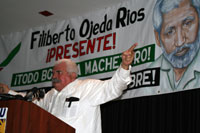Powerful memorial honors slain Machetero leader
By
Arturo J. Pérez Saad
Published Nov 23, 2005 9:12 AM
It was
standing-room-only Nov. 18 at the Martin Luther King Jr. Labor Center here in
Manhattan as hundreds of supporters of Puerto Rico’s liberation from U.S.
colonial rule gathered to pay tribute to the assassinated Filiberto Ojeda
Ríos.
Comandante Ojeda Ríos was leader of the Popular Army
of the People, commonly known as the Macheteros. He was killed on Sept. 23 in an
FBI assault on his home in Puerto Rico.
The large attendance at this event
was particularly noteworthy because the U.S. government has announced a witch
hunt against pro-independence Puerto Ricans and their sympathizers. The threat
of arrests has been openly publicized and widely distributed via Puerto Rican
newspapers since the cold-blooded killing of 72-year-old Ojeda
Ríos.
The U.S. government chose to carry out this assassination on
Sept. 23—the date known in Puerto Rico as “el Grito de Lares”
for the day in 1868 when Puerto Ricans began their struggle against Spanish
colonial rule.
The New York event was sponsored by the September 23rd
Pro-Independence Network, which includes ProLibertad, Socialist Front of New
York, the Puerto Rican Nationalist Party of New York (PNPR-JNY) and its youth
section, October 27th Committee, Puerto Rican Independence Party (PIP), National
Pro-Independence Movement Hostosiano (MINH), ANSWER, Socialist Workers Party,
Party for Socialism and Liberation, International Action Center and Workers
World Party.
Most of the talks were in Spanish, showing the militant
nature of the struggle of Puerto Ricans to resist colonial occupation. Speakers
included former political prisoners Rafael Cancel Miranda, Antonio Camacho
Negrón and Pam Africa. Messages were heard from Ojeda Ríos’s
widow, Elma Beatriz Rosada Barbosa, as well as imprisoned Black journalist Mumia
Abu-Jamal.
In a short videotape of an interview made in the 1990s, Ojeda
Ríos thoughtfully explained the political basis for the clandestine
movement to free Puerto Rico.
Attorney Roger Wareham of the D-12 Movement
spoke, as did representatives from the PIP, the PNPR-JNY and its
youth.
Rafael Cáncel Miranda, who had been in Cuba when the
state-sponsored murder took place, began his remarks by stating to the crowded
room that “being here makes me feel like fighting.” He continued
that the FBI had “made a grave mistake because there isna bullet that can
silence and kill a people who struggle and resist being conquered. The real
terrorists are the North American [government] and the class that supports
it.”
Even though the U.S. ruling class wishes to silence those who
support independence, said Roxana Badillo from the PIP, the pro-independence
movement is “alive and well and not dying as the press wishes to portray
it.” She compared the tactics the U.S. government uses today to terrorize
the Puerto Rican people to “that old and illegal
COINTELPRO”—the “counter-intelligence program” used in
the 1960s and 1970s to break up liberation movements in the
U.S.
“Empires can seem omnipotent and all-powerful, but they are
transitory, as history has shown us,” said Antonio Camacho Negrón.
“What is not transitory is love and dignity. To be a revolutionary is to
practice and function through the preservation of life.” The U.S.
government “does not understand the depth and breadth of the assassination
of Filiberto,” said Camacho.
The event included cultural
performances by Don Divino, Yerbabuena and Prisionera and concluded with the
singing of La Borinqueña.
Articles copyright 1995-2012 Workers World.
Verbatim copying and distribution of this entire article is permitted in any medium without royalty provided this notice is preserved.
Workers World, 55 W. 17 St., NY, NY 10011
Email:
[email protected]
Subscribe
[email protected]
Support independent news
DONATE


